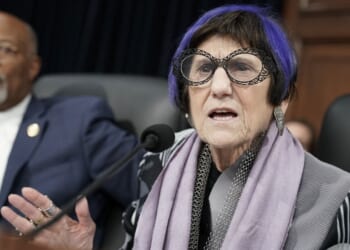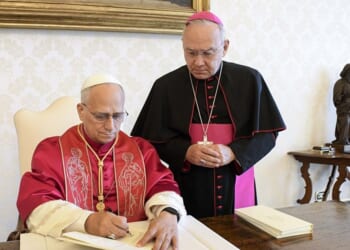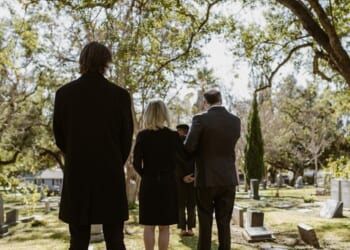Vice President JD Vance made an appeal to Christians and people of faith across the world during a visit to Israel on Tuesday.
“And I know that Christians have many titles for Jesus Christ, and one of them is the Prince of Peace,” Vance said. “And I’d ask all people of faith, and in particular my fellow Christians, to pray that the Prince of Peace can continue to work a miracle in this region of the world.”
“I think we have made incredible strides over the past week. We’re going to have to make a lot more, but I think with your prayers, with God’s providence, and with a very good team behind me, I think we’re going to get it done,” Vance said while speaking at a press conference just a few hours after arriving in Israel.
Vance is vocal about his faith, having converted to Catholicism in 2019.
The vice president is in Israel just about a week after the formal signing of a peace deal that started a ceasefire between Israel and Hamas after two years of war. The deal is based on President Donald Trump’s 20-point peace plan and includes the release of all hostages. All living hostages and 13 deceased hostages have been returned to Israel, but the remains of 15 hostages are still in Gaza.
Hamas’ failure to return all the remains of the deceased hostages within the allotted time frame, and reported incidents of ceasefire violations, including an attack on Israeli troops in Gaza that left two soldiers dead, have raised concerns over the future of the peace deal.
While Vance said he is not certain the ceasefire will hold, he expressed confidence in a future of peace in the Middle East.
“But look, right now, I feel very optimistic. Can I say with 100% certainty that it’s going to work? No, but you don’t do difficult things by only doing what’s 100% certain,” Vance said while speaking at the new Civilian Military Cooperation Center in Israel, a joint U.S.-Israeli facility aimed at upholding the ceasefire.
Vance pushed back on claims that the ceasefire is ending, arguing the tension is not unusual given that the peace deal is being carried out between peoples who “who hate each other, who have been fighting against each other for a very long time.”
“We are doing very well. We are in a very good place. We’re going to have to keep working on it, but I think we have the team to do exactly that,” Vance said.
Steve Witkoff, U.S. special envoy to the Middle East, and Jared Kushner, the president’s son-in-law who helped to broker the peace deal between Israel and Hamas, stood behind Vance as he spoke. Both Witkoff and Kushner are expected to continue playing a significant role in the peace deal as it unfolds. The second phase of the deal is expected to include the complete disarmament of Hamas and a permanent end to the war.
“Our warning to Hamas is very straightforward,” Vance said. “The terms of the 20-point plan that the president put out there is very clear. It’s supported not just by Israel, by all of our Gulf-Arab friends. It’s that Hamas has to disarm. It’s that Hamas has to actually behave itself, and that Hamas, while all the fighters can be given some sort of clemency, they’re not going to be able to kill each other, and they’re not going to be able to kill their fellow Palestinians.”
After the ceasefire took effect, Hamas terrorists began carrying out public executions of Gazans who were perceived to have cooperated with Israel.
Vance said he does not know who will rule Gaza in the future, but the administration is focused now on ensuring the people of both Israel and Gaza can “live in some measure of security and stability.”
“I think once we’ve got to a point where both the Gazans and our Israeli friends can have some measure of security, we will worry about what the long-term governance of Gaza is. Let’s focus on security and rebuilding and giving people food and medicine,” Vance said. “If we get to the point where we are arguing exactly what the governance structure in Gaza is long-term, we should pat ourselves on the back.”
















